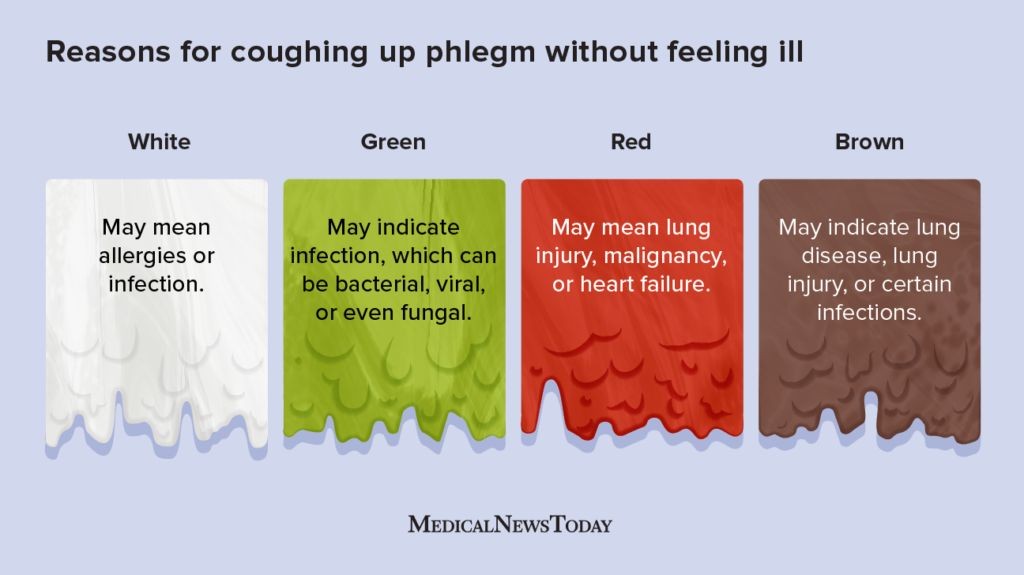Coughing and mucus production are typical bodily responses, especially when your respiratory system is trying to clear out irritants or fight off infections. An increase in mucus, often referred to as phlegm when it’s coughed up, can be a sign of various underlying conditions. While it’s a common symptom, understanding why you’re coughing up mucus is crucial for addressing the root cause and seeking appropriate care if needed.
 Close-up illustration depicting various colors of phlegm and their potential health implications.
Close-up illustration depicting various colors of phlegm and their potential health implications.
Coughing up phlegm is frequently associated with upper respiratory tract infections (URTIs), like the common cold. These infections are usually accompanied by other symptoms such as a runny nose, sore throat, and sneezing. However, coughing with mucus can also indicate more serious conditions affecting the lower respiratory tract or other systems in your body.
Common Causes of Coughing Up Mucus:
-
Upper and Lower Respiratory Tract Infections: Infections like the common cold, flu, bronchitis, and pneumonia are primary culprits behind increased mucus production. These infections irritate the airways, leading to inflammation and the production of mucus to trap and expel pathogens. Lower respiratory infections, such as bronchitis and pneumonia, often result in more persistent and severe symptoms.
-
Acid Reflux (GERD & LPR): Gastroesophageal reflux disease (GERD) occurs when stomach acid frequently flows back into the esophagus. This backflow can irritate the esophagus and trigger a cough. Laryngopharyngeal reflux (LPR) is a related condition where stomach acid reaches the voice box and even the nasal passages, causing similar irritation and mucus production. Symptoms alongside a cough might include heartburn, sore throat, difficulty swallowing, and excessive saliva.
-
Allergies: Allergic rhinitis, or nasal allergies, can mimic cold symptoms, including coughing. Allergens trigger the release of histamine, leading to inflammation and mucus production in the nasal passages and airways. Postnasal drip, where excess mucus drains down the throat, is common in allergies and can stimulate coughing to clear the throat.
-
Environmental Irritants: Exposure to irritants in the environment can also lead to coughing up mucus. Smoke, fumes, dust, and air pollution can irritate the airways, causing inflammation and increased mucus production as the body tries to protect itself.
-
Lung Diseases: Chronic lung conditions like asthma and chronic obstructive pulmonary disease (COPD) are often characterized by a persistent cough and excess mucus. These diseases involve inflammation and airway obstruction, leading to mucus buildup and the body’s attempt to clear the airways through coughing. Other symptoms of lung disease may include shortness of breath and wheezing.
-
Heart Failure: While less commonly associated with coughing up mucus, heart failure can also be a cause. In heart failure, the heart’s inability to pump blood effectively can lead to fluid buildup in the lungs. This fluid can mix with mucus, resulting in a cough that produces white or pink-tinged phlegm. Heart failure is a serious condition and is usually accompanied by other symptoms like shortness of breath, fatigue, and swelling in the extremities.
When to Seek Medical Advice:
While coughing up mucus can be a normal response to minor irritations or infections, it’s important to consult a healthcare professional if you experience any of the following:
- Persistent cough lasting more than a few weeks.
- Changes in the color or consistency of your mucus (especially if it’s bloody, green, or dark).
- Fever, chest pain, or shortness of breath accompanying the cough.
- Coughing up mucus associated with symptoms of heart failure, such as swelling and fatigue.
Understanding the potential causes of coughing up mucus empowers you to seek appropriate medical attention and manage your symptoms effectively. While many cases are due to common infections, it’s crucial to rule out more serious underlying conditions, especially if the cough is persistent or accompanied by concerning symptoms.
